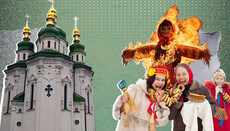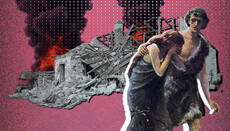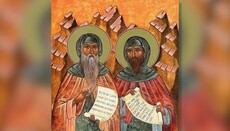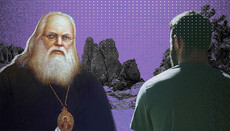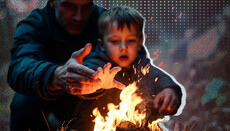Faith grows stronger in trials: How Ukrainians speak to God amid turmoil
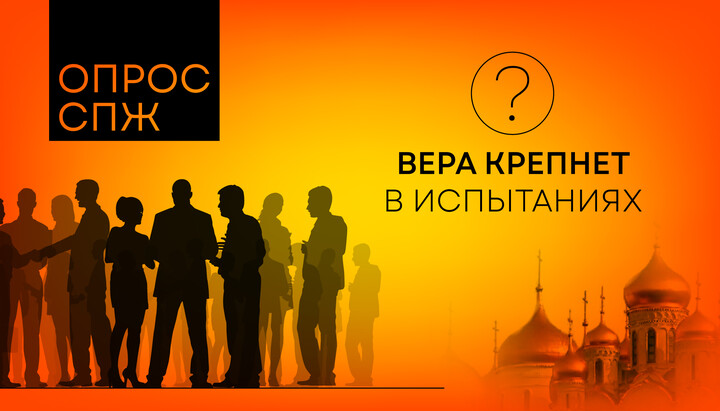
The UOJ editorial team continues to ask residents of Ukrainian cities about their spiritual lives. This time, we asked people what their faith in God means to them and how it has changed during the current period of hardship.
When our Lord Jesus Christ walked through towns and villages healing the sick and the possessed, He would ask them a deeply important question: “Do you believe that I am able to do this?” One telling response came from the father of a demon-possessed boy: “I believe, Lord; help my unbelief!” (Mark 9:24).
Often, faith in God lies dormant within a person and awakens only when the soul is shaken by turmoil. This turmoil may take many forms – from unrequited love to the loss of a loved one. In catastrophic situations, faith in divine help also “wakes up.” There is a reason behind the saying: “There are no atheists in a falling airplane.”
Beyond personal trials, every person is also affected by societal hardships, such as poverty, instability, and of course, war. For several years now, Ukrainians have remained both witnesses to and participants in tragic events unfolding before their eyes.
Such sorrowful events compel us to reevaluate our values, to deepen our search for the meaning of suffering, and to reflect on the significance of faith in God as a life preserver in the stormy sea of grief.
To better understand the spiritual foundation currently being laid in the hearts of our fellow citizens, we asked them the following questions:
– Do you believe in God? If so, why? If not, why not?
– Do you pray to God? If so, with what words?
– How has the war in Ukraine affected your faith?
On faith, unbelief, and doubt
The answers showed that the majority of Ukrainians believe in God. Among those surveyed, 67% identified themselves as believers, and 33% as atheists. The first group consisted mainly of middle-aged and older people. The second group – mostly youth.
The results point to the ongoing presence of the phenomenon known as “youthful atheism,” where young people, even those raised in religious families, often express rebellion against their parents’ values as they come of age.
It is also worth noting that even among believers, there were differing perceptions of God. Most described their faith in God as belief in a Person, but some imagined God as an impersonal higher power.
Behind this kind of pantheism, people often attempt to escape personal responsibility for their actions. If God is “impersonal,” then He cannot judge, punish, or reward. In that case, moral standards of good and evil are defined not by God, but by each individual – and God, in this view, remains distant and unknowable.
Faith in salvation vs. faith in progress
Responses to the question “Why do you believe – or not believe – in God?” yielded particularly interesting insights.
Atheists typically justified their unbelief through belief in scientific progress or adherence to their own “personal religion.” Some young people honestly admitted that they hadn’t yet “matured” into a conscious faith – which came across as refreshingly sincere.
Meanwhile, some of those surveyed not only expressed personal belief in God, but also encouraged others to believe. One nurse recounted moments when parents are in despair seeing their child gravely ill:
“I tell them: ‘Pray, because we can only treat, but true healing depends on God!’” said this missionary in a white coat.
Other believers highlighted how God answers their prayers, helps them survive difficult times, and fills their lives with deep meaning.
“I believe in God because He inspires me with hope for the life to come – for the soul is eternal!” said a young respondent.
Sacred prayers: “Our Father” and “He That Dwelleth”
Unsurprisingly, the most frequently mentioned prayer that people turn to in times of need was the Our Father. As a precious tradition, the Lord’s Prayer has been passed down from generation to generation.
One elderly woman recalled a story from the Second World War. As the Nazis retreated, they employed a scorched-earth strategy – setting fire to everything from cultivated fields to barns and homes. Seeing the occupiers approach, her family hid in a small shed. The Germans, bearing flaming torches, were already near.
Then her mother and the children began to pray aloud, fervently reciting the 90th Psalm: “He that dwelleth in the help of the Most High shall abide under the protection of the God of Heaven…” Just meters away from their hiding place, the Germans stopped, extinguished their torches, and left. The praying family was saved.
War strengthens faith
Reflections on war and peace are found not only in classical literature, but also in the writings of the Church Fathers. Preachers often view war as both a consequence of human sinfulness and as divine chastisement for unbelief.
St. Nicholas (Velimirovich), in his book War and the Bible, wrote: “A world without God is the cradle of war.”
War, like any national tragedy, always lays bare the hidden corners of the soul, strips away masks, and exposes the secret thoughts and intentions of the heart. That is why we are sometimes shocked to see familiar people in a completely new light.
When asked: “How has the war in Ukraine affected your faith?” respondents gave varied and sometimes contradictory answers.
Faith and hope in God – and the power of prayer – grew stronger among the relatives of those currently serving on the front lines. This confirms that in times of great hardship, faith can indeed grow stronger.
At the same time, not everyone placed their hope in the Lord. Some survey participants expressed confidence that their greatest hope was in chaplains and volunteers. While recognizing the tremendous human effort in the pursuit of peace, from a Christian perspective we must not forget the words of Christ: “Without Me you can do nothing. (John 15:5).
In сonclusion
This latest survey conducted by the Union of Orthodox Journalists revealed both unity and diversity in how Ukrainians perceive the vital issue of faith in God amid prevailing evil.
Despite external attempts to distort traditional views on spirituality and impose new ones, people continue to place their trust in the Lord and in the voice of a believing heart.
What remains is to follow the powerful call of St. John Chrysostom:
“Let us repent – and by our repentance, move God to end wars and grant us the enjoyment of every blessing.”
